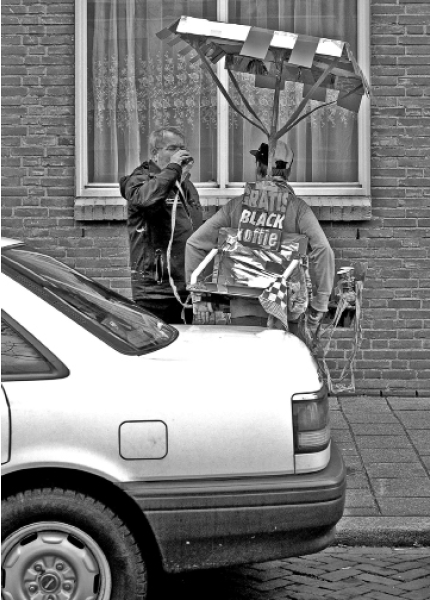
FREE COFFEE
first performed on January 15, 2017
Noordwal, The Hague, Netherlands
performed four times in 2017
ARTHUR CORDIER
The Hague, Netherlands / Brussels, Belgium
arthurcordier.com
FREE COFFEE
ARTHUR CORDIER
“Free Coffee” is a work developed in public space that imitates a street vendor boutique. Coffee is given for free, but the cups are attached to a frame that I am wearing by a wire, based on the idea that “when it’s free you are the product.” The performance continues as long as there is coffee to serve.
The coffee is free, and I don’t promote anything except the interactions created between the shop owner (me) and the consumer (the audience). This performance questions the economic imprint on urban landscapes in a materialized and visible way. It also contains the possibility of a shop, and simulates merchant behaviors. Economy is an intangible material as it shapes our interactions, social norms and architecture.
More specifically, this piece is about the promiscuity between friendship, social norms and merchant relationships in our daily life. The shop simulates a function that isn’t fulfilled, this way it counteracts our habits and our commercial politeness.
In this piece, the audience is confronted with a specific temporality. It simulates the characteristics of an event in order to create interaction.
Engagement isn’t a goal in itself. This would mean, from my perspective, that there is a preconceived idea of the result of the outcome: that the audience, through our interactions, responds to my requests. The audience has to find its own interest, from a personal and even egoist perspective.
Consequently, as I freely create something for myself, the audience can choose to engage or not. This element is central to respect each individual’s freedom. By assuming your own egoism, you respect other people’s choices.
By acknowledging egoism as the implicit rule of capitalism, this performance gives space to tackle economic dimensions of interactions in their complexity, and on a social level. This introduces wider economic topics. On one hand is my interest to be involved in the making of public and urban space, which is characterized through installations and site-specific works. On the other hand, there is the insecurity of the artists’ economy, where we rely on a neoliberal and entrepreneurial vision of our practice in spite of a better option.
I run my own business, and I ruin it by giving free coffee. I address theoretical issues without frontally imposing it on my audience.
From this point of view, “Free Coffee” can be seen as a simple coffee break.